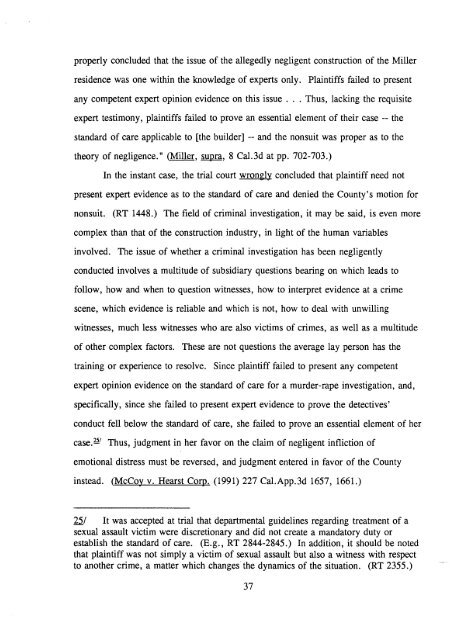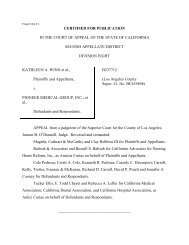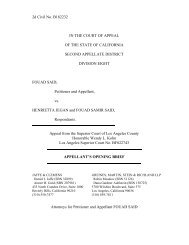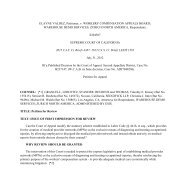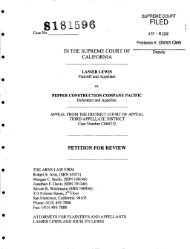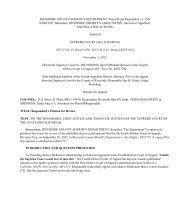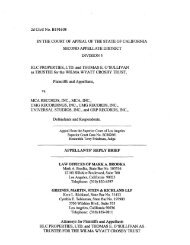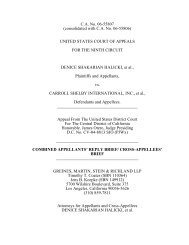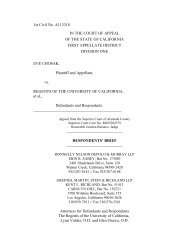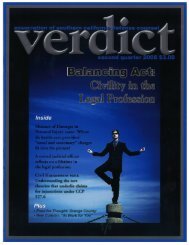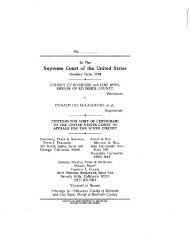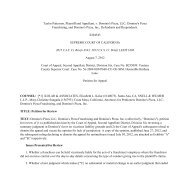Amylou R. v. County of Riverside Appellant's Opening Brief
Amylou R. v. County of Riverside Appellant's Opening Brief
Amylou R. v. County of Riverside Appellant's Opening Brief
Create successful ePaper yourself
Turn your PDF publications into a flip-book with our unique Google optimized e-Paper software.
properly concluded that the issue <strong>of</strong> the allegedly negligent construction <strong>of</strong> the Miller<br />
residence was one within the knowledge <strong>of</strong> experts only.<br />
Plaintiffs failed to present<br />
any competent expert opinion evidence on this issue ... Thus, lacking the requisite<br />
expert testimony, plaintiffs failed to prove an essential element <strong>of</strong> their case -- the<br />
standard <strong>of</strong> care applicable to [the builder] -- and the nonsuit was proper as to the<br />
theory <strong>of</strong> negligence." (Miller, supra, 8 Cal.3d at pp. 702-703.)<br />
In the instant case, the trial court wrongly concluded that plaintiff need not<br />
present expert evidence as to the standard <strong>of</strong> care and denied the <strong>County</strong>'s motion for<br />
nonsuit.<br />
(RT 1448.) The field <strong>of</strong> criminal investigation, it may be said, is even more<br />
complex than that <strong>of</strong> the construction industry, in light <strong>of</strong> the human variables<br />
involved. The issue <strong>of</strong> whether a criminal investigation has been negligently<br />
conducted involves a multitude <strong>of</strong> subsidiary questions bearing on which leads to<br />
follow, how and when to question witnesses, how to interpret evidence at a crime<br />
scene, which evidence is reliable and which is not, how to deal with unwilling<br />
witnesses, much less witnesses who are also victims <strong>of</strong> crimes, as well as a multitude<br />
<strong>of</strong> other complex factors.<br />
These are not questions the average lay person has the<br />
training or experience to resolve. Since plaintiff failed to present any competent<br />
expert opinion evidence on the standard <strong>of</strong> care for a murder-rape investigation, and,<br />
specifically, since she failed to present expert evidence to prove the detectives'<br />
conduct fell below the standard <strong>of</strong> care, she failed to prove an essential element <strong>of</strong> her<br />
case. lll<br />
Thus, judgment in her favor on the claim <strong>of</strong> negligent infliction <strong>of</strong><br />
emotional distress must be reversed, and judgment entered in favor <strong>of</strong> the <strong>County</strong><br />
instead. (McCoy v. Hearst Corp. (1991) 227 Cal.App.3d 1657, 1661.)<br />
22./ It was accepted at trial that departmental guidelines regarding treatment <strong>of</strong> a<br />
sexual assault victim were discretionary and did not create a mandatory duty or<br />
establish the standard <strong>of</strong> care. (E.g., RT 2844-2845.) In addition, it should be noted<br />
that plaintiff was not simply a victim <strong>of</strong> sexual assault but also a witness with respect<br />
to another crime, a matter which changes' the dynamics <strong>of</strong> the situation. (RT 2355.)<br />
37


